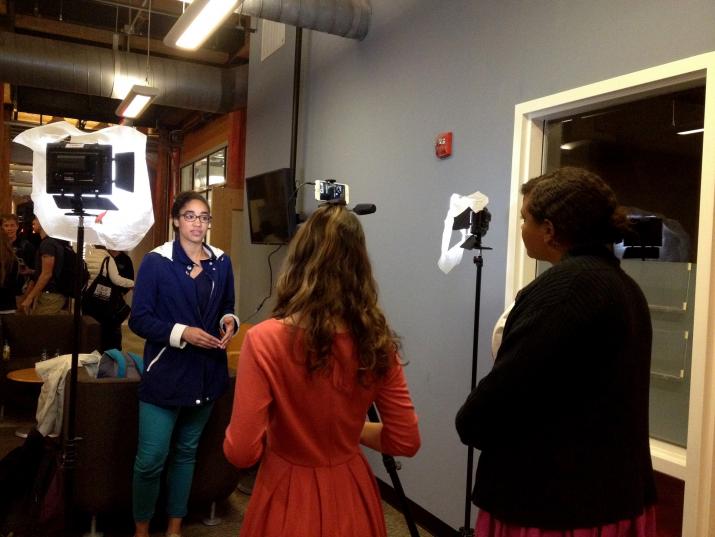
Global Health Humanities students making a video blog through the use of an iPhone.
Published January 20, 2015, last updated on April 9, 2018 under Education News
Since the 1970s, medical education programs have increasingly focused on training physicians not just as technicians, but as healers. This trend led to a new field called “medical humanities,” which uses poetry, stories, visual art, film and other media to help physicians develop critical skills such as observation, listening and empathy so they can engage effectively with their patients.
And now, through a new three-year Global Health Humanities project funded by the Dean of Humanities and the Franklin Humanities Institute, faculty at Duke are exploring whether this model could enhance global health education. Could “global health humanities” be one of the next new health fields?
Dialog among Students, Faculty, and Speakers Helps to Bridge Disciplines
Through the Global Health Humanities project, students and faculty from global health and other fields have structured opportunities to explore global health issues through a humanities lens, exposing them to new ways of thinking about their area of study.
Each semester, the program pairs two faculty—one in global health and one in humanities, art, or interpretive social science—to teach the same materials on the same week and bring their two classes together for an invited speaker event. At the event, students participate in a conversation designed to highlight theoretical perspectives, methods and questions that bridge their respective disciplines and engage in a discussion about the possibilities for the humanities in global health.
True to the cross-disciplinary nature of the project, a steering committee comprised of four faculty from across the university provides leadership:
- Margaret Humphreys, professor of history and medicine
- Deborah Jenson, director of the Center for Latin American and Caribbean studies and professor of romance studies and global health
- Neil Prose, director of pediatric dermatology and the Duke Global Health Institute (DGHI) affiliate faculty member
- Kearsley “Karrie” Stewart, associate professor of global health and cultural anthropology
Seeing Global Health in a New Light
Last fall, the first semester of the program, Brandon Kohrt, assistant professor of psychiatry, global health and cultural anthropology at DGHI, was paired with Stephen Smith, professor of African and African American Studies. Students from Kohrt’s Global Mental Health course and Smith’s Conflict Analysis in Africa course joined together in November to watch and discuss “Coexist,” a documentary film that explores programs that promote reconciliation among the Tutsi and Hutu after the 1994 genocide in Rwanda. Robert Koenig, the filmmaker, was the invited speaker.
Fengdi Pei, an MSc-GH student at DGHI, reflected on the experience: “This program gave me a brand new perspective. Now when I look at global health issues, I will not only be a researcher and learn the facts and data, but I’ll also look into people’s suffering, emotions, relationships and their own thoughts about the issue.”
Documentary Film Highlights Human Stories
Kohrt thinks film was an effective medium to inspire thoughtful conversation and reflection among the students. “Film is about human stories,” he said. “Discipline-specific jargon can remove us from human experience, and film gives people a common narrative and language from which to explore the issues.”
Steering committee member Stewart concurs, also noting, “Through these discussions, students learn how to discern what’s real versus what’s a narrative designed by filmmakers to manipulate emotions.”
Students Also Gain Hands-on Communications Experience
One key element of the program is the assignment of student ambassadors—four students who lead efforts to document and publicize the project. Their charge includes developing a website and producing a short video about the experience. In the fall, Caitlin Margaret Kelly, public program director at Duke’s new Power Plant Gallery, mentored the students.
Kohrt emphasized the value of learning not only the academic content of the courses, but also developing the ability to communicate about global health issues in a way that is compelling to a broad audience. Through the project, students develop both storytelling skills as well as technical skills such as operating a video camera and conducting interviews.
Pei, one of the student ambassadors, commented, “As a global health student, I think it’s important to learn how we can take advantage of media to promote global health ideas and education. This program gave me an opportunity to learn some of these skills from specialists and put the skills into practice.”
Next Up: Gender Identity through the Body
Stewart describes one of her roles in the project as “matchmaker.” When pairing faculty together, she and the steering committee consider the question, “What would help amplify the students’ awareness of the limitations of their own discipline?”
This semester, Asia Maselko, assistant professor of psychiatry and behavioral sciences and global health at DGHI, will join Sumathi Ramaswamy, professor of history, in exploring the body, gender and nationalism in late 20th century India.
Joseph Alter, a professor and medical anthropologist at the University of Pittsburgh, will be the guest at the culminating project event on April 1. Participants will watch excerpts from two documentary films, Hero Pharmacy and The World Before Her, and students will lead a panel discussion.
Stay tuned for an article in April about another exciting global health humanities project at Duke!
Watch the student video from fall 2014.


